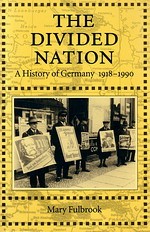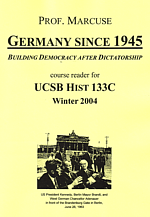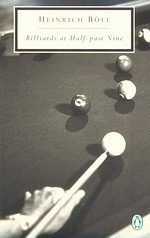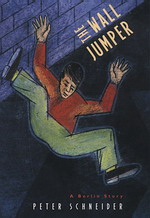Old
Announcements
(back to top)
- Dec. 15, 2003: web site still under construction.
- Dec. 15, 2003: This course is currently full (40
students). If you want to be on a waiting list, e-mail me (marcuse@history.ucsb.edu).
[Dec. 23, 03: 4 students waitlisted]
- Dec. 26, 2003: draft syllabus (link)
and reader TOC (link) added
- Jan. 4, 2004: Note that the class meets in Building
327, rm 104 (across the parking lot from the MultiCultural
Center end of the UCen, near the Psych building), MWF at 9am.
- Jan. 5, 2004: The readings for Jan. 7 are also available
on-line: poem "The Master
Race"; H-German
discussion comparing Iraq in 2003 and Germany in 1945
- Jan. 6, 2004: The publisher has run out of
stock on the textbook (Fulbrook). You can either order used
copies from on-line suppliers (see below), or
the UCEN bookstore will place an "on-demand" order (I'll ask
about this in class on 1/8.) Meanwhile there is a copy on 2-hour reserve
at the library. (As is the reader; the other books are on 24-hour reserve.)
- Jan. 7: I've asked the bookstore to order 18 copies
of the textbook. Lecture 2 outline available (link).
- Jan 12: textbook update:
The UCEN bookstore expects them Jan. 23, but sometimes the publishers
ships them in lots of 2-3, and they arrive earlier. If you prepay, they
will call you as soon as the books arrive.
- Jan. 12: For 1/14/04 review the following textbook pages: 12+25,
32f, 46f, 55-7, 67, 137f, 170, 180ff, 212ff, 247, 254, 282, 337f. Make
a list of the acronyms of the political parties (esp. the post-1945
parties!) and what they mean, and note whether they are on the political
left, in the center, or on the political right. (Maybe draw a diagram.)
If you haven't been able to purchase the textbook, there is a copy on
2-hour reserve at the library. Or just look up the parties SPD, CDU,
FDP, SED, KPD, Greens, Center, DDP. Many websites just link the the
parties' pages (in German), but here is one with descriptions in English:
- GermanCulture.com has an overview page with links to English
descriptions of the parties (link)
- The University of Bristol (UK) has a page with party logos linking
to their homepages (sorry, in German) (link).
- Jan. 13: book essay handout
added (also many links to the Reader TOC,
and topics section, below)
- Jan. 13: electronic copy of textbook available
through our library's pegasus (link
- search "Fulbrook divided nation" gives you two copies, one
electronic). The title link takes you to netlibrary, where you give
yourself a login and password. If you just "browse" it (you
can type in page numbers in the upper right), others can use it at the
same time; if you "check it out," no one else can access it.
- Jan. 17: the textbook is now available
in the UCEN bookstore; Böll handout
available (hard copies outside my office door); for paper/book essay
topic see also the section below.
- Jan. 19: L4-states
(maps added 1/20), L5-parties
(more images added 1/23), L6-Weimar&Nazi
outlines available
- Jan. 22, 2004 Reviews for book proposal: Several
students have had difficulty finding reviews of their books. If you
can't find any, submit what you have, and say how you attempted to find
reviews. If I still want some, I'll tell you and make suggestions about
where you might find them.
- Jan. 22: L7-Experience
of defeat added. For Friday, be sure to read the assigned pages
in Fulbrook, and think about who is responsible for the Cold War.
- Jan. 24: L8-4 Ds &
2 Rs of Potsdam Conference added
- Jan. 26: L9-1953
& After added
- Jan. 27: Reminder: Q4 on Wednesday will be drawn
from the Böll reading.
- Jan. 30: L10-West
in 1950s and L11-Unite or Divide
1952-61 added (Feb 1: images added to L11)
- Feb. 1, 2004: I have to cancel my office hours on
Tuesday, Feb. 3. If you were planning on coming that day, please contact
me to make an appointment for Wed. (10-noon) or Thu (11-1)
- Feb. 2: L12-1960s
now available. Q5 on Friday will be based on the film shown Wednesday
(The Promise, see imdb;
available
on amazon).
- Feb. 7: please note that the book essay summaries
and drafts are due on Monday, 2/9/04.
- Feb. 7: L14-60s Foreign
Policy now available.
- Feb. 9: A handout for
The Reader
will be was distributed in class. For
background, see this 1997
interview with Schlink by Ron Hogan. A 1998
interview offers some interesting detail about Schlink's life.
Random House has information about Schlink's next book Flights of
Love, a collection of seven short stories published in English
in 2002 (link).
A set of questions is also posted on the internet (readinggroupguide;
also
on amazon).
- Feb. 12: L16-Presence
of Nazi Past, 1945-1960s now available
- Feb. 17: L17-Nazi
Past, 1960s-80s now available, also midterm
evaluation form for 2/
1820/04.
- Feb. 19: L18-Arguing
Theses now available (without images). Be sure to read Schneider,
The Wall Jumper for Friday, 2/20. Q7
will ask what his main thesis is.
- Feb. 20: L19-Dissent
in West Germany now available (images
in progress added 2/22).
After today's class I happened to read this review of a book about "German
anti-militarism" (link).
The author of the review argues that this German "tradition"
was cemented by the unconditional defeat in World War II. (In lecture
I argued that it could be seen as going back much further.)
- Feb. 23: web option
handout available.
- Feb. 24: L20-DissentStasiState
available. Be sure to read sources #12 & #13 for Wed.
- Feb. 25: Two talks coming up. Submit one paragraph describing
what it was about, and you can get up to 4 points per talk extra
credit. NOTE: no more make-ups Qs will be possible--this is your
chance.
- Feb. 26, 5pm: TALK: THE LIFE JOURNEY OF CHILD
HOLOCAUST SURVIVORS
Dr. Robert Krell (Psychiatrist, Author, Child Survivor)
Thursday, February 26 / 5:00 P.M. / FREE
Bronfman Family Jewish Community Center, 524 Chapala Street, Santa
Barbara
Robert Krell survived the Holocaust as a hidden child in Holland.
Eventually he became a noted child psychiatrist recognized, in particular,
for his scholarly research and public lectures on the psychological
trauma in Holocaust survivors and their children. He co-authored
an updated, translated edition of Judith Hemmendinger Feist's book,
The Children of Buchenwald: Child Survivors and Their Post-War
Lives (2000) which recounts the story of the 426 young survivors
sent from Buchenwald to France.
- Friday, 2-4pm, 6020 HSSB
panel discussion "Survivors of Trauma," with Robert Krell
and UCSB professors
- Feb. 12: Class mailing list "hist133@mail.lsit.ucsb.edu"
now operational. First, go to this site: https://mail.lsit.ucsb.edu/mailman/listinfo.cgi/hist133
to enter your e-mail address and give yourself a password. Next,
check your e-mail and respond to the automatic message (usually, "reply"
will work) to confirm your address.
I will send a message to that list when I add new material to this website,
so you don't have to keep checking. (And I'll unsubscribe everyone when
the course is over.)
[2/17/04: 5 students have signed up; 8 total by 2/21;
9 on 2/24]
- Mar. 1, 2004: L21,
L22, L23
(all about building a mass movement and the fall of the Berlin wall),
and chronological handout added (no
images yet).
- Mar. 4: For Friday, 3/5, be sure to read
the Bornemann essay #14 in the reader, and Fulbrook chap. 13 on
the East German revolution. L24
(no images yet) also added.
- Mar. 5, 7:40am: late-breaking clarification: Yes,
the book summary can (should) be integrated into the
final version of your paper. If you did not do this yet, don't worry,
since those of you NOT doing the web option will be submitting the prospectus
and the previous draft version, I can read it there.
Web option: please only submit the hard copy version I returned
to you this week, plus a disk or e-mail with the electronic version.
Non-web: If you don't have exactly the right things with you, don't
fret. Turning in the final printout in class ensures that you made the
deadline. You can submit the rest this afternoon or Monday.
- Mar. 7: L25-Unification
uploaded (no images yet)
- Mar. 8: first web essay uploaded: S.
Ables, Gorbachev and the German Question (1995) (link);
index page for web essays begun
- Mar. 9: The index page
for web essays now has final versions of the essays for the student
presentations (Carini,
Ables, Sandhoff,
Magaña), and preliminary
versions for
- Mar. 9: If we have time after the presentations,
we'll do Q10 on Wednesday (3/10). Read Chap. 14 of Fulbrook, esp. from
p. 357 on. What factors contributed to the stability of the post-1945
German states?
- Mar. 11: FALSE ALARM: I found all of the corrected
Krell-extra credit submissions. I'll return them on Friday.
- Mar. 11: exam study
guide, L26-PostUnification,
L27-Presentations now available
- Mar. 13: The take-home final exam will be available
on Wed., 3/17, at noon on this site and at my office (check the envelope
outside my door if I'm not there later in the afternoon or evening).
It is designed to take only 2 hours (see exam
study guide).
It is due on Thu., 3/18, by 11am in my office, HSSB
4221.
- Mar. 13: I will be out of town until Tuesday late,
so there will be no more updates to this site until Wed., 3/17, morning.
I may be able to respond to e-mail Monday (3/15) night.
- Mar. 13: L28-Conclusion
now available.
- Mar. 13: no information on final grades will be available
until after Tue. 3/23 (at the earliest)
- Mar. 17, 2004: the final exam is available:
html; pdf
version for printing. Due March 18, by 11am in my office, HSSB 4221.
|
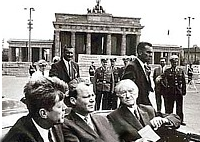
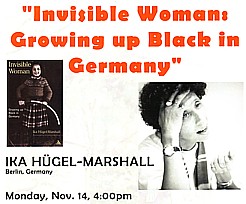
 Apr.
2, 2004: The German film Goodbye Lenin
just opened in Santa Barbara. It is a wonderful comedy that turns
the fall of the Berlin wall on its head (the Westerners flood eastward!).
A must-see for students in this course--you'll recognize much of the
documentary footage we saw. Here are some links:
Apr.
2, 2004: The German film Goodbye Lenin
just opened in Santa Barbara. It is a wonderful comedy that turns
the fall of the Berlin wall on its head (the Westerners flood eastward!).
A must-see for students in this course--you'll recognize much of the
documentary footage we saw. Here are some links: 